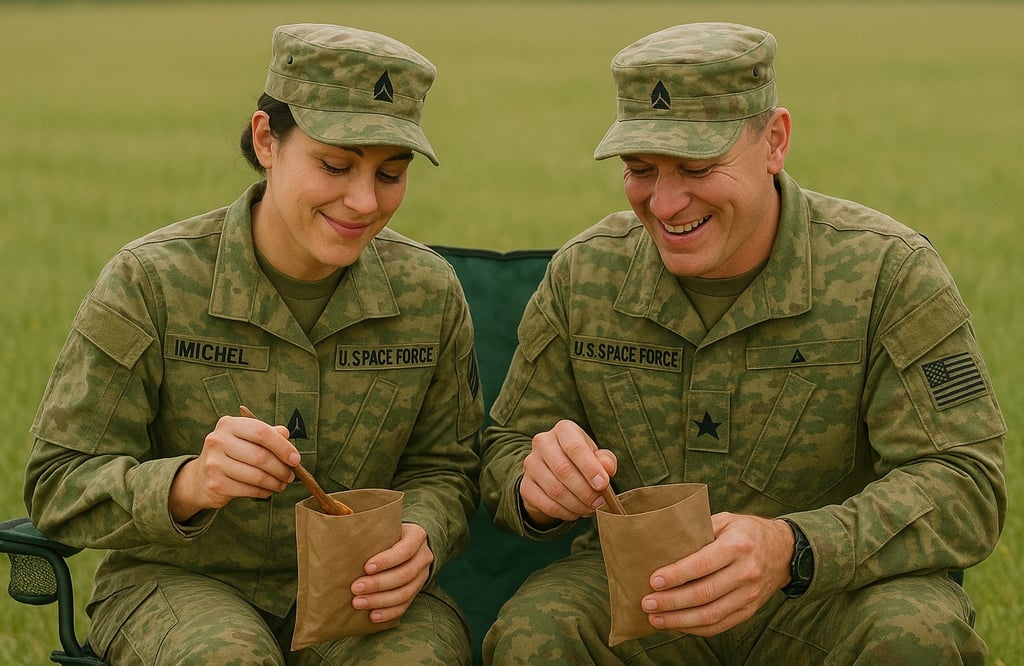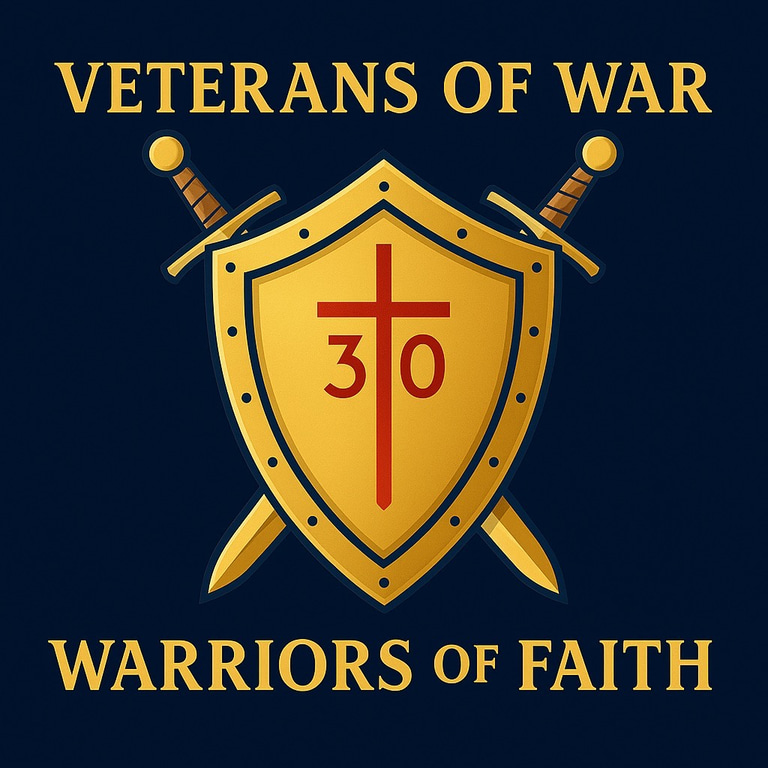Food for Thought
Blog post description.
CH Rick
8/22/20256 min read


God’s Word as Your Daily Ration
As a veteran, I know what it means to depend on rations. In the field, you quickly learn to appreciate Meals Ready‑to‑Eat not because they taste like home, but because they contain what you need to keep going. You don’t skip a meal on patrol, and you don’t save your ration for another day because you must be at full strength when the mission calls. After the military, I discovered that there is another kind of ration that is just as essential – daily time in God’s Word. The Gospel of Mark has been a faithful companion on this journey.
A Soldier’s Hunger
Jesus understood the physical needs of people. When five thousand hungry people followed Him into a remote area, His disciples wanted to send them away, but Jesus refused. He took five loaves and two fish, blessed them, and fed everyone until they were satisfied. Another time, He had compassion on a crowd that had been with Him three days; knowing they would faint on the way home, He took seven loaves and a few fish and provided for four thousand. These stories remind me of the small brown pouches we would tear open during a field exercise. They never looked like much, yet they sustained us. In the same way, God’s Word seems simple at first glance, but it contains nourishment for our souls.
Growing up in a military family, I thought that grit and physical strength were all I needed. But combat zones are not only physical; the mind and heart fight battles too. Jesus knew this. After the disciples returned from a mission, He told them, “Come away by yourselves to a desolate place and rest a while”. They were so busy they didn’t even have time to eat. The Lord’s invitation to rest comes to veterans whose schedules are still dictated by mission, shift or therapy. He knows we cannot give what we do not have. Taking in God’s Word is not a luxury – it’s our daily ration for strength and resilience.
Learning from the Master Trainer
Mark writes that Jesus rose very early in the morning, while it was still dark, and went to a secluded place to pray. Prayer and Scripture were not optional even for the Son of God. If our Commander in Chief sought quiet moments with His Father, how much more do we need that time? When I was stationed overseas, I would sometimes skip meals so I could get more sleep. It never ended well. The same happens when we skip spiritual food. The moment will come when a crisis hits – a bad call from the doctor, the memory of a buddy who didn’t make it home, a struggle with guilt or temptation – and we will either have spiritual reserves or be running on fumes.
Taking up the Word daily teaches us the rhythm of service and rest. Jesus reminded religious leaders that “the Sabbath was made for man, not man for the Sabbath”. Rest is God’s gift, not a restriction. Those of us trained to press on at all costs need permission to receive this gift. The Scriptures also reveal our mission. Jesus declared that the Son of Man came “not to be served but to serve, and to give His life as a ransom for many”. No one understands sacrifice better than veterans. When we read about Christ’s service and self‑giving love, our sense of purpose is refined. Service is no longer merely a duty; it becomes an overflow of gratitude to the One who served us first.
Rations for the storms
Veterans know storms – literal ones in the Gulf or the Pacific, and internal ones that rage long after the gunfire stops. Mark tells of a violent storm on the Sea of Galilee. The disciples feared for their lives while Jesus slept. When they woke Him, He commanded, “Peace! Be still!” and the wind and waves obeyed. He then asked, “Why are you so afraid? Have you still no faith?”. In another storm story, Jesus came to the disciples walking on the water and said, “Take heart; it is I. Do not be afraid.” Reading these accounts during my darkest nights reminded me that the One who commands the seas also speaks peace into our post-traumatic storms. His Word is more than history; it’s a lifeline when anxiety surges or when memories surface unexpectedly.
When a father brought his demon-tormented son to Jesus, he pleaded, “If you can do anything, have compassion on us.” Jesus replied, “All things are possible for one who believes.” The father’s honest cry – “I believe; help my unbelief!” – resonates with veterans wrestling with faith and doubt. The Scriptures do not shame our weakness; they invite us to bring it to the One who can strengthen us. That invitation includes a call to vigilance: “Watch and pray that you may not enter into temptation. The spirit indeed is willing, but the flesh is weak.”. Just as a sentry keeps watch over a perimeter, time in God’s Word keeps our hearts alert to pitfalls and helps us respond with wisdom instead of reacting impulsively.
Love as the ration’s seasoning.
Daily rations in boot camp were bland. We learned to carry hot sauce or peanut butter to improve the taste. In our spiritual diet, love is the seasoning that makes everything nourishing. When asked about the greatest commandment, Jesus said, “You shall love the Lord your God with all your heart and love your neighbor as yourself. There is no other commandment greater than these”. Veterans understand brotherhood. We have carried each other’s packs and shielded each other from harm. Reading Scripture reminds us that loving God and our neighbor is not optional. It is what gives our service its flavor. Without love, discipline can turn into harshness and courage into coldness.
The call to love also redefines strength. Jesus told the crowd that anyone who wanted to follow Him must deny himself, take up his cross, and follow. In a culture that values self‑preservation, the Gospel presents a paradox: we gain life by losing it. Veterans know what it means to lay down our rights for a greater cause. Scripture transforms that instinct into spiritual reality. We are reminded that our ultimate allegiance is to the Kingdom of God and that our strength is perfected in surrender. Denying ourselves daily may involve forgiving someone who betrayed us, seeking help for PTSD instead of trying to tough it out, or serving a neighbor quietly without recognition.
How to take your daily ration
Schedule it like a mission briefing. Pick a time you can stick to. For many, mornings before the house wakes up work well. Remember, Jesus rose early while it was still dark to pray. If your work schedule is unpredictable, keep a small New Testament or Bible app accessible to read during breaks.
Start with the Gospel of Mark. It’s action-oriented and speaks to people who are on the move. Its short, vivid stories – feeding the multitudes, calming the storm, walking on water– provide snapshots of who Jesus is and what He offers. Read a few paragraphs and ask, “What does this tell me about Christ, and how can I respond today?”
3. Pray as you read. Don’t treat Scripture like a checklist. Talk to God about what you see, much like you would debrief after patrol. When the Word exposes pain or sin, confess it. When it reveals a promise, hold onto it.
4. Share your rations. In the field, we learned that sharing an extra packet of peanut butter could build camaraderie. In the same way, discussing what you’re reading with a spouse, a friend, or a fellow veteran can encourage both of you. When Jesus provided bread for the crowds, He involved His disciples; they distributed what He blessed. We are called to do the same.
5. Remember the goal. The point of spending time in Scripture is not to gain knowledge alone but to know Jesus. He is the One who calms storms, restores the broken, and gives His life for us. Without a relationship with Him, daily rations become stale rules. With Him, they become a feast.
Hope and joy for the journey
Reading God’s Word daily does more than teach us theology; it produces hope. When Jesus told His frightened disciples, “Take heart; it is I. Do not be afraid”, He wasn’t offering empty words – He was revealing Himself as the source of courage. When He multiplied bread and fish for those who had nothing, He showed that He cares about both our physical and spiritual hunger. When He commanded the storm to be still, He demonstrated that no chaos is beyond His control. These truths, taken in small portions each day, become the rations that sustain veterans through long nights, lonely transitions to civilian life, and the lingering effects of service.
Finally, recall Jesus’ answer to Satan’s temptation: “Man shall not live by bread alone, but by every word that comes from the mouth of God.” Physical rations kept us alive in Iraq, Afghanistan, or on a submarine, but the Scriptures keep our souls alive. They are God’s invitation to daily fellowship. So, dear fellow veteran and anyone else reading this, I encourage you to treat God’s Word like your daily ration. Don’t leave home without it. Don’t let discouragement or busyness cut you off from the only food that can truly satisfy. As we feast on the living Word, we will find hope for today, strength for tomorrow, and joy that nothing in this world can take away.
Hours of Operation
Monday through Friday, 9 am to 5 pm
Veterans Service Center hours
Monday through Friday, 8 am to 5 pm
The Mighty 30
A Veteran's Ministry
